Stéphane Mallarmé (1842-1898). L’après-midi d’un faune. Églogue (The Afternoon of a Faun. Eclogue)… avec frontispice, fleurons & cul-de-lampe [par Édouard Manet]. Paris: Alphonse Derenne, 1876. Signed by Mallarmé. Copy 57 of 195. Purchased with funds provided by the Friends of the Princeton University Library. Graphic Arts GA 2011- in process.
In 1865, Stéphane Mallarmé composed a poem about the sensual experiences of a faun who wakes from an afternoon nap and recounts his encounter with several nymphs earlier in the day.
Originally titled Le Faune, intermède héroique (The Faun, a Heroic Intermezzo), Mallarmé submitted it to the Théâtre-Français, only to be rejected. Ten years later, the work was again rejected, under the title Improvisation d’un Faune, by Alphonse Lemerre, who had previously published Mallarmé work in Parnasse contemporain.
Mallarmé left Lemerre and found Alphonse Derenne, a publisher of medical books who wanted to expand his business. Under the title L’après-midi d’un faune, Mallarmé’s pastoral was finally published in April 1876. The text was printed in specially designed Elzevir type—175 copies on Van Gelder Holland paper and 20 on Imperial Japon—with particular attention to typography, spacing, and punctuation. His best friend, Édouard Manet (1832-1883), created four wood-engraved embellishments that were printed in black and hand tinted in pink by Manet himself to save money.
Princeton’s copy contains an ex libris with a vignette by Manet mounted on the blank leaf preceding the half title, inscribed with the name of the original owner, the French artist and draftsman Émile-Antoine Bayard (1837-1891). He is best known today for his illustration of Cosette from Les Misérables by Victor Hugo, reused for the Broadway musical by the same name.
Although Mallarmé is a seminal figure of our modern literary heritage, few editions of his own work were published during his lifetime. Princeton University Library holds 149 editions by Mallarmé but only five published before his death in 1898 and the majority of these are his critical studies of other artists. Rare Books and Special Collections owns the 1889 edition of Les poèmes d’Edgar Poe, translated by Mallarmé with illustrations by Manet. We also have the 1956 translation of L’après-midi d’un faune by Aldous Huxley and a German/French edition from 1975.
Mallarmé’s work would become the inspiration for many musical pieces, the most prominent of which was Claude Debussy’s Prélude à l’après-midi d’un faune (1894), a ten-minute tonal interpretation of Faune. Other composers who adapted the melodic aspects of Mallarmé’s poetry were Maurice Ravel in Trois poèmes de Stéphane Mallarmé (1913), Darius Milhaud with Chansons bas de Stéphane Mallarmé (1917), and Pierre Boullez, whose hour-long solo soprano and orchestra piece Pli selon pli (1957-62).
Mallarmé’s poems are notoriously difficult to understand. Proust wrote: “How unfortunate that so gifted a man should become insane every time he takes up the pen.” Here is an excerpt first in the original French and then, in one possible English translation.
Non, mais l’âme
De paroles vacante et ce corps alourdi
Tard succombent au fier silence de midi :
Sans plus il faut dormir en l’oubli du blasphème,
Sur le sable altéré gisant et comme j’aime
Ouvrir ma bouche à l’astre efficace des vins !
Couple, adieu ; je vais voir l’ombre que tu devins.
No, but the soul
Void of words, and this heavy body,
Succumb to noon’s proud silence slowly :
With no more ado, forgetting blasphemy,
I must sleep, lying on the thirsty sand, and how I love
to open my mouth to wine’s celestial effect !
Farewell to you, both: I go to see the shadow you have become.
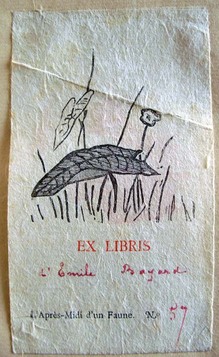
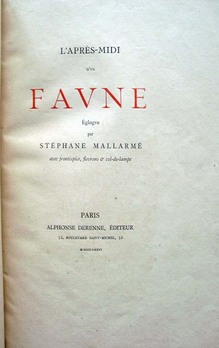
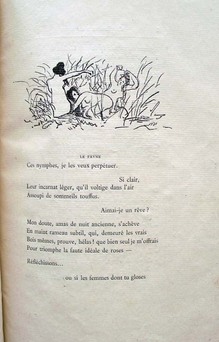
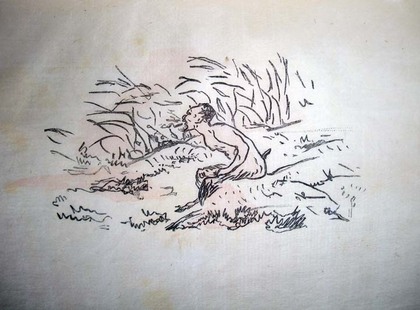
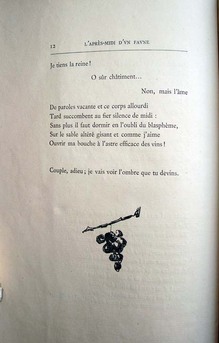
I have some or all of this same poem. I have copied most of it. Some is in good condition, some is very badly disintegrating. The picture you show of the faun is on very thin separate paper. The ex libris page is No 84 in red ink. I would love to send copies of these and of course, hope they could be good. A hand written note (in French) is on the bottom of the page and signed S.M, the m is quite fancy. I was in the antiques business for 25 years and would not send you something that is ridiculously not antique. The cover is a material that almost feels like fabric. There is a very small envelope inside back cover with a very small pink tassel. I thank you for any info you might provide and hope you will think this worthy of a reply. Joyce Barth